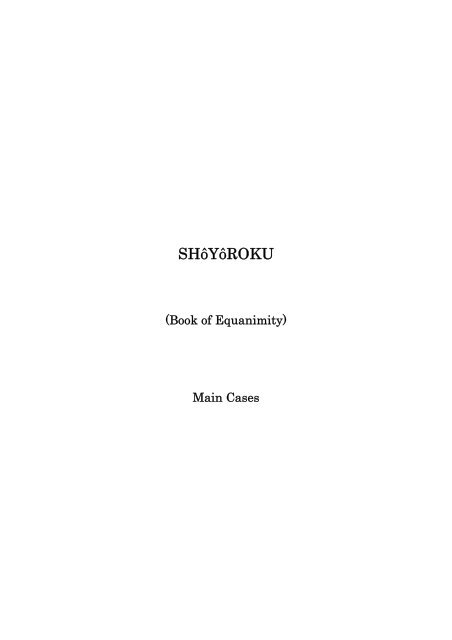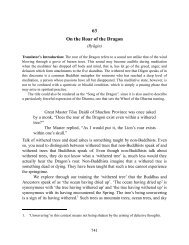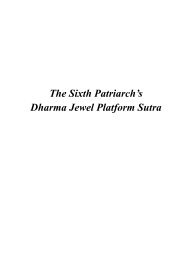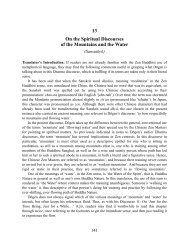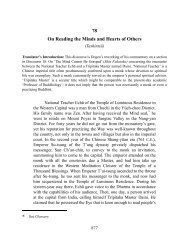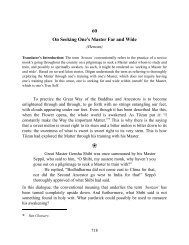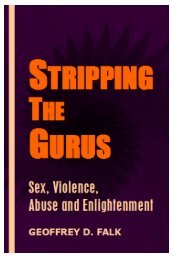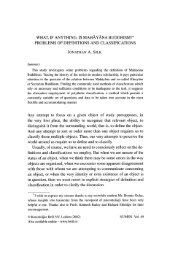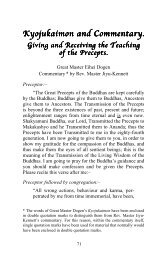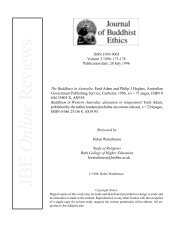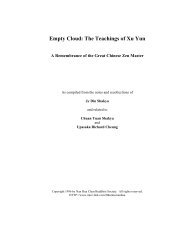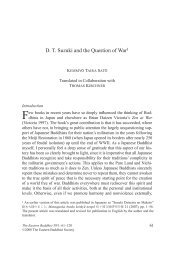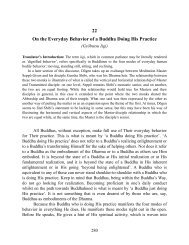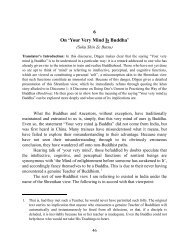Book of Equanimity - thezensite
Book of Equanimity - thezensite
Book of Equanimity - thezensite
You also want an ePaper? Increase the reach of your titles
YUMPU automatically turns print PDFs into web optimized ePapers that Google loves.
SHôYôROKU<br />
(<strong>Book</strong> <strong>of</strong> <strong>Equanimity</strong>)<br />
Main Cases
Contents<br />
CASE 1: The World-Honored One Ascends the Rostrum –See Hekiganroku Case 92<br />
CASE 2: Bodhidharma's "Vast and Void" –See Hekiganroku Case 1<br />
CASE 3: The Indian King Invites the Patriarch<br />
CASE 4: The World-Honored One Points to the Ground<br />
CASE 5: Seigen's "Price <strong>of</strong> Rice"<br />
CASE 6: Master Ba's "White and Black" –See Hekiganroku Case 73<br />
CASE 7: Yakusan Ascends the Rostrum<br />
CASE 8: Hyakujô and the Fox –See Mumonkan Case 2<br />
CASE 9: Nansen Kills a Cat –See Mumonkan Case 14; Hekiganroku Cases 63, 64<br />
CASE 10: An Old Woman near Taizan –See Mumonkan Case 31<br />
CASE 11: Unmon's "Two Diseases"<br />
CASE 12: Jizô Plants the Rice Field<br />
CASE 13: Rinzai's "Blind Donkey"<br />
CASE 14: Attendant Kaku Offers Tea<br />
CASE 15: Kyôzan Thrusts His Hoe into the Ground<br />
CASE 16: Mayoku Shook the Ring-Staff –See Hekiganroku Case 31<br />
CASE 17: Hôgen's "Hairsbreadth"<br />
CASE 18: Jôshû's Dog<br />
CASE 19: Unmon's "Mt. Sumeru"<br />
CASE 20: Jizô's "Most Intimate"<br />
CASE 21: Ungan Sweeps the Ground<br />
CASE 22: Gantô's Bow to the Kaatz<br />
CASE 23: Roso Faces the Wall<br />
CASE 24: Seppô's "Look at the Snake" –See Hekiganroku Case 22<br />
CASE 25: Enkan's "Rhinoceros Fan" –See Hekiganroku Case 91<br />
CASE 26: Kyôzan Points to Snow<br />
CASE 27: Hôgen Points to the Bamboo Blinds –See Mumonkan Case 26<br />
CASE 28: Gokoku's "Three Disgraces"<br />
CASE 29: Fuketsu's "Iron Ox" –See Hekiganroku Case 38<br />
CASE 30: Daizui's "Kalpa Fire"—See Hekiganroku Case 29 (without the second half)<br />
CASE 31: Unmon's "Pillar" –See Hekiganroku Case 83<br />
CASE 32: Kyôzan's Mind and Objective World<br />
CASE 33: Sanshô's "Golden Scales" –See Hekiganroku Case 49<br />
CASE 34: Fuketsu's "Speck <strong>of</strong> Dust" –See Hekiganroku Case 61<br />
CASE 35: Rakuho's Obeisance<br />
CASE 36: Master Ba Is Ill --See Hekiganroku Case 3<br />
CASE 37: Isan's "Karma-Consciousness"<br />
CASE 38: Rinzai's "True Person"<br />
CASE 39: Jôshû's "Wash Your Bowls" –See Mumonkan Case 7<br />
CASE 40: Unmon's "White and Black"<br />
CASE 41: Rakuho at His Deathbed<br />
CASE 42: Nan'yô and the Water Jug<br />
CASE 43: Razan's "Appearing and Disappearing"<br />
CASE 44: Kôyô's "Suparnin"<br />
CASE 45: Four Phrases from the Engaku Sutra<br />
CASE 46: Tokusan's "Study Accomplished"<br />
2
CASE 47: Jôshû's "Oak Tree in the Garden" –See Mumonkan Case 37<br />
CASE 48: Vimalakirti's "Not-Two" –See Hekiganroku Case 84<br />
CASE 49: Tôzan and the Memorial Service<br />
CASE 50: Seppô's "What Is This" –See Hekiganroku Case 51<br />
CASE 51: Hôgen's "Boat or Land"<br />
CASE 52: Sôzan's "Dharma-body"<br />
CASE 53: Ôbaku's "Drinkers" —See Hekiganroku Case 11<br />
CASE 54: Ungan's "Great Mercy" —See Hekiganroku Case 89<br />
CASE 55: Seppô in Charge <strong>of</strong> Cooking –See Mumonkan Case 13<br />
CASE 56: Misshi and the White Rabbit<br />
CASE 57: Gon'yô's One "Thing"<br />
CASE 58: "Getting Despised" in the Diamond Sutra —See Hekiganroku Case 97<br />
CASE 59: Seirin's "Deadly Snake"<br />
CASE 60: Tetsuma, the Cow —See Hekiganroku Case 24<br />
CASE 61: Kempô's "One Line" —See Mumonkan Case 48<br />
CASE 62: Beiko's "Enlightenment"<br />
CASE 64: Shishô's "Succession"<br />
CASE 63: Jôshû Asks about "Death" —See Hekiganroku Case 41<br />
CASE 65: Shuzan's "Bride"<br />
CASE 66: Kyûhô's "Head and Tail"<br />
CASE 67: The Wisdom in the Kegon Sutra<br />
CASE 68: Kassan Brandishes the Sword<br />
CASE 69: Nansen's "Cats and Foxes"<br />
CASE 70: Shinsan Asks about Nature<br />
CASE 71: Suigan's "Eyebrows" —See Hekiganroku Case 8<br />
CASE 72: Chûyû's "Monkey"<br />
CASE 73: Sôzan's Filial Fulfillment<br />
CASE 74: Hôgen's "Form and Name"<br />
CASE 75: Zuigan's "Everlasting Principle"<br />
CASE 76: Shuzan's Three Verses<br />
CASE 77: Kyôzan: As His Pr<strong>of</strong>ession Requires<br />
CASE 78: Unmon's "Rice Cake" – See Hekiganroku Case 77<br />
CASE 79: Chôsa Takes a Step<br />
CASE 80: Suibi and the Chin Rest –See Hekiganroku Case 20<br />
CASE 81: Gensha Reaches the Province<br />
CASE 82: Unmon's: "Voice" and "Color"<br />
CASE 83: Dôgo's Nursing the Ill<br />
CASE 84: Gutei's One Finger – See Mumonkan Case 3 and Hekiganroku Case 19<br />
CASE 85: The National Teacher's Gravestone – See Hekiganroku Case 18<br />
CASE 86: Rinzai's Great Enlightenment<br />
CASE 87: Sozan: With or Without<br />
CASE 88: "Non-Seeing" in the Ryôgon Sutra – See Hekiganroku Case 94<br />
CASE 89: Tôzan's "Place <strong>of</strong> No Grass"<br />
CASE 90: Kyôzan Speaks Out – See Mumonkan Case 25<br />
CASE 91: Nansen and the Peonies –See Hekiganroku Case 40<br />
CASE 92: Unmon's "One Treasure" –See Hekiganroku Case 62<br />
CASE 93: Roso Does Not Understand<br />
CASE 94: Tôzan Unwell<br />
CASE 95: Rinzai Draws a Line<br />
3
CASE 96: Kyûhô Does Not Acknowledge<br />
CASE 97: Emperor Dôkô's Helmet Hood<br />
CASE 98: Tôzan's "Intimate with It"<br />
CASE 99: Unmon's "Bowl and Pail" –See Hekiganroku Case 50<br />
CASE 100: Rôya's "Mountains and Rivers"<br />
4
CASE 1: The World-Honored One Ascends the Rostrum – See Hekiganroku Case 92<br />
One day, the World-Honored One ascended to the rostrum. Manjusri struck the table with<br />
the gavel and said, "Contemplate clearly the Dharma <strong>of</strong> the Dharma-King! The Dharma <strong>of</strong><br />
the Dharma-King is like this." Thereupon, the World-Honored One descended from the<br />
rostrum.<br />
CASE 2: Bodhidharma's "Vast and _Void" – See Hekiganroku Case 1<br />
Emperor Bu <strong>of</strong> Ryô asked Great Master Bodhidharma, "What is the highest meaning <strong>of</strong> the<br />
holy reality" Bodhidharma replied, "Vast and void, no holiness." The emperor said, "Who<br />
are you in front <strong>of</strong> me" Bodhidharma said, "I don't know." The emperor did not match him.<br />
Finally, Bodhidharma crossed the Yangtze River and came to the Shôrin Temple. There he<br />
sat for nine years, facing the wall.<br />
CASE 3: The Indian King Invites the Patriarch<br />
A king <strong>of</strong> Eastern India invited the twenty-seventh patriarch, Prajna Tara, for a meal. The<br />
king asked, "Why don't you recite sutras" The patriarch said, "The poor way 1 does not stay<br />
in the world <strong>of</strong> subject when breathing in, and has nothing to do with the world <strong>of</strong> objects<br />
when breathing out. I am always reciting the suchness-sutra in millions and millions <strong>of</strong><br />
volumes."<br />
CASE 4: The World-Honored One Points to the Ground<br />
When the World-Honored One was walking with his assembly, he pointed to the ground with<br />
his hand and said, "This place is good for building a temple." Indra 2 took a stalk <strong>of</strong> grass<br />
and stuck it in the ground and said, "The temple has been built." The World-Honored One<br />
smiled.<br />
CASE 5: Seigen's "Price <strong>of</strong> Rice"<br />
A monk asked Seigen, "What is the essence <strong>of</strong> Buddhism"<br />
rice in Roryô"<br />
Seigen said, "What is the price <strong>of</strong><br />
CASE 6: Master Ba's "White and Black" – See Hekiganroku Case 73<br />
A monk asked Great Master Ba, "Apart from the four Phrases, beyond one hundred<br />
Negations, please tell me directly, Master, the meaning <strong>of</strong> Bodhidharma's coming from the<br />
West." Master Ba said, "I am tired today, I can't explain it to you. Go and ask Chizô." The<br />
monk asked Chizô about it. Chizô said, "Why don't you ask our master" The monk said,<br />
"He told me to ask you." Chizô said, "I have a headache today, I can't explain it to you. Go<br />
1 I.e., "I."<br />
2 Exactly: Sakra devendra. The lord god <strong>of</strong> the Trayastrimasa Heaven.<br />
5
and ask Brother Kai." The monk asked Brother Kai about it. Kai said, "I understand<br />
nothing about that question." The monk told Great Master Ba about it. Great Master said,<br />
" Chizô's head is white, Kai's head is black."<br />
CASE 7: Yakusan Ascends the Rostrum<br />
Yakusan had not ascended the rostrum for a long time. The temple steward said, "All the<br />
assembly has been wishing for instruction for a long time. Please, Master, give your<br />
assembly a sermon."<br />
Yakusan had the bell rung. The assembly gathered. Yakusan ascended the rostrum and<br />
sat there for a while. Then he descended and returned to his room.<br />
The temple steward followed him and asked, "You said a while ago that you would give the<br />
assembly a sermon. Why didn't you speak even a word" Yakusan said, "For sutras, there<br />
are sutra specialists; for sastras 3 , there are sastra specialists. Why do you have doubts<br />
about this old monk"<br />
CASE 8: Hyakujô and the Fox – See Mumonkan Case 2<br />
Whenever Master Hyakujô delivered a sermon, an old man was always there listening with<br />
the monks. When they left, he left too. One day, however, he remained behind. Hyakujô<br />
asked him, "What man are you, standing there" The old man replied, " In the past, in the<br />
time <strong>of</strong> Kashyapa Buddha, I lived on this mountain as a Zen priest. Once a monk came and<br />
asked me, 'Does a perfectly enlightened person fall under the law <strong>of</strong> cause and effect or not'<br />
I said to him, 'He does not." Because <strong>of</strong> this answer, I fell into the state <strong>of</strong> a fox for 500 lives.<br />
Now, I beg you, Master, please say a turning word." Hyakujô said, "The law <strong>of</strong> cause and<br />
effect cannot be obscured." Upon hearing this, the old man became greatly enlightened.<br />
CASE 9: Nansen Kills a Cat -- See Mumonkan Case 14; Hekiganroku Cases 63, 64<br />
Once the monks <strong>of</strong> the eastern and western Zen halls in Nansen's temple were quarrelling<br />
about a cat. As he saw this, Nansen held up the cat and said, "You monks! If one <strong>of</strong> you can<br />
say a word, I will not slay the cat." No one could answer. Nansen cut the cat in two.<br />
Nansen told Jôshû what had happened, and asked him for his view. Jôshû thereupon took<br />
his sandals, put them upon his head and went away. Nansen said, "If you had been there, I<br />
could have spared the cat."<br />
CASE 10: An Old Woman near Taizan – See Mumonkan Case 31<br />
There was an old woman on the way to Taizan. Whenever a monk asked her how to get to<br />
Taizan, she would answer, "Go straight on." After the monk had gone a few steps, she would<br />
say, "This good and naïve fellow goes <strong>of</strong>f that way, too."<br />
Later a monk told Jôshû about this. Jôshû said, "Wait a bit. I will go and see through her<br />
for you." He went and asked the same question.<br />
3 <strong>Book</strong>s on Buddhist doctrines, written by ancient Buddhist philosophers.<br />
6
The next day, Jôshû ascended the rostrum and said, "I have seen through the old woman for<br />
you."<br />
CASE 11: Unmon's "Two Diseases"<br />
Great Master Unmon said, "When the light does not penetrate, there are two diseases.<br />
Everything is unclear and things hang before you – this is one disease. Even after you have<br />
realized the emptiness <strong>of</strong> all things, somehow you feel as if there were still something there.<br />
This shows that the light has not yet penetrated thoroughly.<br />
"Also there are two diseases concerning the Dharma-body. You have reached the<br />
Dharma-body, but you remain attached to the Dharma and cannot extinguish your own view;<br />
therefore you lead a corrupt life around the Dharma-body – this is one disease. Suppose you<br />
have truly penetrated to the end, if you give up further efforts, it will not do. You examine<br />
yourself minutely and say you have no flaw -- this is nothing but a disease."<br />
CASE 12: Jizô Plants the Rice Field<br />
Jizô asked Shuzanshu, "Where have you come from' Shuzanshu said, "I have come from<br />
the South." Jizô said, "How is Buddhism in the South these days" Shuzanshu said,<br />
"There is much lively discussion." Jizô said, "How could that match with our planting the<br />
rice field here and making rice-balls to eat" Shuzanshu said, "How could you then save the<br />
beings <strong>of</strong> the Three Worlds" Jizô said, "What do you call 'the Three Worlds'"<br />
CASE 13: Rinzai's "Blind Donkey"<br />
When Rinzai was about to die, he entrusted Sanshô with his Dharma and said, "After my<br />
passing, do not destroy my treasury <strong>of</strong> the Eye <strong>of</strong> the true Dharma 4 ." Sanshô said, "How<br />
would I dare destroy your treasury <strong>of</strong> the Eye <strong>of</strong> the true Dharma" Rinzai said, "If someone<br />
asks you about it, how will you answer" Sanshô instantly shouted his Kaatz. Rinzai said,<br />
"Who knows that my treasury <strong>of</strong> the Eye <strong>of</strong> the true Dharma has been destroyed by this blind<br />
donkey"<br />
CASE 14: Attendant Kaku Offers Tea<br />
Attendant Kaku asked Tokusan, "Where have all the past saints gone" Tokusan said,<br />
"What What" Kaku said, " I gave the command for an excellent horse like a flying<br />
dragon to spring forth, but there came out only a lame tortoise." Tokusan was silent.<br />
The next day, when Tokusan came out <strong>of</strong> the bath, Kaku served him tea. Tokusan passed his<br />
hand gently over Kaku's back. Kaku said, "This old fellow has gotten a glimpse for the first<br />
time." Again, Tokusan was silent.<br />
4 Originally: shôbôgenzô.<br />
7
CASE 15: Kyôzan Thrusts His Hoe into the Ground<br />
Isan asked Kyôzan, "Where have you come from" Kyôzan said, "From the rice field." Isan<br />
said, "How many people are there in the rice field" Kyôzan thrust his hoe into the ground<br />
and stood with his hands folded on his chest. Isan said, "There are a great number <strong>of</strong> people<br />
cutting thatch on the South Mountain." Kyôzan took up his hoe and left immediately.<br />
CASE 16: Mayoku Shook the Ring-Staff – See Hekiganroku Case 31<br />
Mayoku, with his ring-staff in hand, came to Shôkei. He circled Shôkei's dais three times,<br />
shook the ring-staff and stood there bolt upright. Shôkei said, "Right, right!" Mayoku then<br />
came to Nansen. He circled Nansen's dais three times, shook the ring-staff and stood there<br />
bolt upright. Nansen said, "Not right, not right!" Then, Mayoku said, "Master Shôkei said,<br />
'Right, right!' Why, Master, do you say, 'Not right, not right!'" Nansen said, "With Shôkei<br />
it is right, but with you it is not right. This is nothing but a whirling <strong>of</strong> the wind. In the<br />
end, it will perish."<br />
CASE 17: Hôgen's "Hairsbreadth"<br />
Hôgen asked Shuzanshu, "'If there is only a hairsbreadth <strong>of</strong> difference, it is the distance<br />
between heaven and earth.' 5 How do you understand that" Shuzanshu said, "If there is<br />
only a hairsbreadth <strong>of</strong> difference, it is the distance between heaven and earth." Hôgen said,<br />
"If that's your understanding, how could you ever attain IT" Shuzanshu said, "My view is<br />
just that. How about you, Master" Hôgen said, "If there only is a hairsbreadth <strong>of</strong><br />
difference, it is the distance between heaven and earth." Shuzanshu made a deep bow.<br />
CASE 18: Jôshû's Dog 6<br />
A monk asked Jôshû, "Does the dog have buddha-nature, or not" Jôshû said, "It has" [U].<br />
The monk said, "If it has it, why did it creep into that skin bag" Jôshû said, "Because it<br />
does so knowingly."<br />
Another monk asked, "Does the dog have buddha-nature, or not" Jôshû said, "It has not"<br />
[Mu]. The monk said, "All living beings have buddha-nature 7 . Why doesn't the dog have<br />
any" Jôshû said, "Because it is in its karma-consciousness."<br />
CASE 19: Unmon's "Mt. Sumeru"<br />
A monk asked Unmon. "Not a single thought arises: is there any fault or not" Unmon said,<br />
"Mt. Sumeru 8 ."<br />
5 Cited from the Shinjinmei (A Hymn <strong>of</strong> Sincere Mind), a work by the Third Patriarch Sôsan. See<br />
also Miscellaneous Koans 21-2.<br />
6 See Mumonkan Case 1. The Shôyôroku case presents a fuller text <strong>of</strong> the dialogue.<br />
7 Quotation from the Nirvana Sutra 7, 25.<br />
8 The highest and most massive mountain in the world according to the Indian cosmology.<br />
8
CASE 20: Jizô's "Most Intimate"<br />
Jizô asked Hôgen, "Where are you going, senior monk 9 " Hôgen said, "I am on pilgrimage 10 ,<br />
following the wind." Jizô said, "What are you on pilgrimage for" Hôgen said, "I don't<br />
know." Jizô said, "Non knowing is most intimate." Hôgen suddenly attained great<br />
enlightenment.<br />
CASE 21: Ungan Sweeps the Ground<br />
When Ungan was sweeping the ground, Dôgo said, "You are having a hard time!" Ungan<br />
said, "You should know there is one who doesn't have a hard time." Dôgo said, "If that's true,<br />
you mean there is a second moon" Ungan held up his broom and said, "What number <strong>of</strong><br />
moon is this" Dôgo was silent.<br />
Gensha said, "That is precisely the second moon."<br />
Unmon said, "The servant greets the maid politely."<br />
CASE 22: Gantô's Bow to the Kaatz<br />
Gantô came to Tokusan. He straddled the threshold <strong>of</strong> the gate and asked, "Is this ordinary<br />
or is this holy" Tokusan shouted, "Kaatz!" Gantô made a deep bow.<br />
Hearing <strong>of</strong> this, Tôzan said, "Hardly anyone but Gantô could have accepted it that way."<br />
Gantô said, "Old Tôzan can't tell between good and bad. At that time, I raised up with one<br />
hand and suppressed with the other."<br />
CASE 23: Roso Faces the Wall<br />
Whenever Roso saw a monk coming, he immediately sat facing the wall.<br />
Hearing <strong>of</strong> this, Nansen said, "I usually tell my people to realize what has existed before the<br />
kalpa <strong>of</strong> emptiness 11 , or to understand what has been before Buddhas appeared in the world.<br />
Still, I haven't acknowledged one disciple or even a half. If he continues that way, he will go<br />
on even until the year <strong>of</strong> the donkey 12 ."<br />
CASE 24: Seppô's "Look at the Snake" – See Hekiganroku Case 22<br />
Seppô, instructing the assembly, said, "There's a poisonous snake on the southern side <strong>of</strong> the<br />
mountain. All <strong>of</strong> you should look at it carefully!" Chôkei said, "Today in the Zen hall there<br />
are many people. They have lost their body and life."<br />
A monk told this to Gensha, who said, "Only Elder Brother Ryô [Chôkei] could say something<br />
like that. However, I wouldn't talk like that." The monk asked, "What then would you say,<br />
9 "Senior monk" (jôza) is an honorific for a monk who has practiced more than 10 years.<br />
10 Originally: angya.<br />
11 One <strong>of</strong> the "four kalpas" or periods <strong>of</strong> cosmic changes: the kalpa <strong>of</strong> creation, the kalpa <strong>of</strong> existence,<br />
the kalpa <strong>of</strong> destruction, and the kalpa <strong>of</strong> emptiness.<br />
12 Since there is no "year <strong>of</strong> the donkey" in the Chinese zodiac, the expression "until the year <strong>of</strong><br />
donkey" means endlessly.<br />
9
Master" Gensha replied, "Why does it have to be 'the southern side <strong>of</strong> the mountain'"<br />
Unmon threw his staff in front <strong>of</strong> Seppô and acted frightened.<br />
CASE 25: Enkan's "Rhinoceros Fan" --See Hekiganroku Case 91<br />
One day, Enkan called to his attendant, "Bring me the rhinoceros fan."<br />
The attendant said, "It is broken." Enkan said, "If the fan is already broken, bring me the<br />
rhinoceros himself." The attendant gave no answer.<br />
Shifuku drew a circle and wrote the ideograph "ox" in it.<br />
CASE 26: Kyôzan Points to Snow<br />
Kyôzan pointed to the snow lion 13 and said, "Is there any 14 that goes beyond this color"<br />
Unmon said 15 , "I would have pushed it over for him at once."<br />
Setchô said 16 , "He only knows how to push it over, but he doesn't know how to help it up."<br />
CASE 27: Hôgen Points to the Bamboo Blinds --See Mumonkan Case 26<br />
Hôgen pointed to the bamboo blinds with his hand. At that moment, two monks who were<br />
there went over to the blinds together and rolled them up. Hôgen said, "One has gained, one<br />
has lost."<br />
CASE 28: Gokoku's "Three Disgraces"<br />
A monk asked Gokoku, "How about when a crane perches on a withered pine tree" Gokoku<br />
said, "It is a disgrace when seen from the ground."<br />
The monk asked, "What about when every drop <strong>of</strong> water is frozen at once" Gokoku said,<br />
"It's a disgrace after the sun has risen."<br />
The monk asked, "At the time <strong>of</strong> the Eshô Persecution 17 , where did the good Guardian<br />
Deities 18 <strong>of</strong> the Dharma go" Gokoku said, "It is a disgrace for the two <strong>of</strong> them on both sides<br />
<strong>of</strong> the temple gate."<br />
CASE 29: Fuketsu's "Iron Ox" – See Hekiganroku Case 38<br />
When he was staying at the government <strong>of</strong>fice <strong>of</strong> the Province Ei, Fuketsu entered the hall [to<br />
preach] and said, "The heart seal [stamp] <strong>of</strong> the patriarch resembles the activity <strong>of</strong> the iron ox.<br />
When it goes away, the [impression <strong>of</strong> the] seal remains; when it stays there, the [impression<br />
13 Probably a lion made <strong>of</strong> snow or a stone lion covered with snow.<br />
14 I.e., "anyone" or "anything."<br />
15 I.e., later.<br />
16 I.e., hearing <strong>of</strong> this.<br />
17 Buddhism was suppressed by order <strong>of</strong> Emperor Bu (about 840).<br />
18 Niô-figures representing the two Deva kings on each side <strong>of</strong> the main gate <strong>of</strong> a Buddhist temple.<br />
They are considered to be protectors <strong>of</strong> the Dharma.<br />
10
<strong>of</strong> the] seal is brought to naught. If it neither goes away nor stays, would it be right to give a<br />
seal [<strong>of</strong> approval] or not"<br />
Then Elder Rohi came up and said, "I have the activities <strong>of</strong> the iron ox. [However,] I ask<br />
you, Master, not to give me the seal." Fuketsu said, "I am accustomed to leveling the great<br />
ocean through fishing whales. But, alas, now I find instead a frog wriggling about in the<br />
mud." Rohi stood there considering. Fuketsu shouted "Kaatz!" and said, "Why don't you<br />
say anything else, Elder" Rohi was perplexed. Fuketsu hit him with his whisk and said,<br />
"Do you remember what you said Say something, I'll check it for you." Rohi tried to say<br />
something. Fuketsu hit him again with his whisk.<br />
The Magistrate said, "Buddha's law and the King's law are <strong>of</strong> the same nature." Fuketsu<br />
said, "What principle do you see in them" The Magistrate said, "If you do not make a<br />
decision where a decision should be made, you are inviting disorder."<br />
Fuketsu descended from the rostrum.<br />
CASE 30: Daizui's "Kalpa Fire" 19<br />
A monk asked Daizui, "When the great kalpa fire bursts out, the whole universe 20 will be<br />
destroyed. I wonder if IT will also be destroyed or not." Daizui said, "Destroyed." The<br />
monk said, "If so, will IT be gone with the other 21 " Daizui said, "Gone with the other."<br />
A monk asked Ryûsai, "When the great kalpa fire bursts out, the whole universe will be<br />
destroyed. I wonder if IT will also be destroyed or not." Ryûsai said, "Not destroyed." The<br />
monk said, "Why is it not destroyed" Ryûsai said, "Because it is the same as the whole<br />
universe."<br />
CASE 31: Unmon's "Pillar" – See Hekiganroku Case 83<br />
Unmon, instructing the assembly, said, "The old buddha and a pillar intersect each other.<br />
What number <strong>of</strong> activity is that" The assembly was silent. He said on their behalf,<br />
"Clouds gather over the South Mountain; rain falls on the North Mountain."<br />
CASE 32: Kyôzan's Mind and Objective World<br />
Kyôzan asked a monk, "Where do you come from" The monk said, "I am from Yû Province"<br />
Kyôzan said, "Do you think <strong>of</strong> that place" The monk said, "I always do." Kyôzan said,<br />
"That which thinks is the mind 22 . That which is thought about is the objective world.<br />
Within that are mountains, rivers and the great earth, towers, palaces, people, animals, and<br />
other things. Reflect upon the mind that thinks. Are there a lot <strong>of</strong> things there" The<br />
monk said, "I don't see anything at all there." Kyôzan said, "That's right for the stage <strong>of</strong><br />
understanding, but not yet for the stage <strong>of</strong> personalization." The monk said, "Do you have<br />
any special advice, Master" Kyôzan said, "It is not right to say that there is or there is not.<br />
Your insight shows that you have obtained only one side <strong>of</strong> the mystery. Sitting down,<br />
putting on clothes – from now on you see by yourself."<br />
19 See Hekiganroku Case 29. The Shôyôroku case has an additional part with Ryûsai.<br />
20 Literally: "a billion worlds."<br />
21 The word "the other" means "the universe."<br />
22 Originally: kokoro.<br />
11
CASE 33: Sanshô's "Golden Scales" – See Hekiganroku Case 49<br />
Sanshô asked Seppô, "When a fish with golden scales has passed through the net, what<br />
should it get for food" Seppô said, "I will tell you when you have passed through the net."<br />
Sanshô said, "A great Zen master with 1500 disciples doesn't know how to speak." Seppô<br />
said, "The old monk is just too busy with temple affairs."<br />
CASE 34: Fuketsu's "Speck <strong>of</strong> Dust" – See Hekiganroku Case 61<br />
Fuketsu, giving instruction, said, "If one raises a speck <strong>of</strong> dust, the house and the nation<br />
prosper. If one does not raise a speck <strong>of</strong> dust, they perish."<br />
Setchô held up his staff and said, "Is there anyone who lives and dies with this"<br />
CASE 35: Rakuho's Obeisance<br />
Rakuho came to Kassan and without bowing stood facing him. Kassan said, "A chicken<br />
dwells in the phoenix nest. It's not <strong>of</strong> the same class. Go away." Rakuho said, "I have<br />
come from far away, hearing much about you. Please, Master, I beg you to guide me."<br />
Kassan said, "Before my eyes there is no you, and here there is no old monk 23 ." Rakuho<br />
shouted, "Kaatz!" Kassan said, "Stop it, stop it. Don't be so careless and hasty. Clouds<br />
and the moon are the same; valleys and mountains are different from each other. It is not<br />
difficult to cut <strong>of</strong>f the tongues <strong>of</strong> the people under heaven. But how can you make a<br />
tongueless person speak" Rakuho said nothing. Kassan hit him. With this, Rakuho<br />
started to obey Kassan.<br />
CASE 36: Master Ba Is Ill -- See Hekiganroku Case 3<br />
Great Master Ba was seriously ill. The temple steward asked him, "Master, how are you<br />
feeling these days" Great Master said, "Sun-faced Buddha, Moon-faced Buddha."<br />
CASE 37: Isan's "Karma-Consciousness"<br />
Isan asked Kyôzan, "Suppose a man asks you, saying, 'All living beings are tossed in a vast<br />
karma-consciousness, and have no foundation to rely upon.' How would you check him"<br />
Kyôzan said, "If such a monk appears, I call out to him, 'Mr. So-and-so!' When he turns his<br />
head, instantly I say, 'What is this' If he hesitates, then I say to him, 'Not only is there a<br />
vast karma-consciousness, but also there is no foundation to rely upon.'" Isan said, "Good."<br />
CASE 38: Rinzai's "True Person"<br />
23 I.e., "I."<br />
12
Rinzai instructed his assembly and said, "There is one true person <strong>of</strong> no rank, always coming<br />
out and going in through the gates <strong>of</strong> your face 24 . Beginners who have not yet witnessed<br />
that, look! look!"<br />
Then a monk came out and asked, "What is the one true person <strong>of</strong> no rank" Rinzai<br />
descended from the rostrum and grabbed him. The monk hesitated. Rinzai pushed him<br />
away and said, "The true person <strong>of</strong> no rank -- what a shit-stick you are!"<br />
CASE 39: Jôshû's "Wash Your Bowls" -- See Mumonkan Case 7<br />
A monk asked Jôshû, "I have just entered this monastery. I beg you, Master, please give me<br />
instructions." Jôshû asked, "Have you eaten your rice gruel yet" The monk answered,<br />
"Yes, I have." Jôshû said, "Then wash your bowls."<br />
CASE 40: Unmon's "White and Black"<br />
Unmon asked Kempô, "May I ask for your answer 25 " Kempô said, "Have you ever reached<br />
this old monk or not" Unmon said, "If so, I must say I was too late." Kempô said, "Is that<br />
so Is that so" Unmon said, "I thought I was Marquis White, but I find that here is<br />
Marquise Black 26 ."<br />
CASE 41: Rakuho at His Deathbed<br />
When he was about to die, Rakuho addressed his assembly and said, "I have one matter to<br />
ask you about. If you say 'yes' to this, you are putting another head on your own. If you say<br />
'no,' you are looking for life by cutting <strong>of</strong>f your head." The head monk said, "The green<br />
mountain always lifts up its legs; you don't need to carry a lantern in the daylight." 27<br />
Rakuho said, "What time is this to utter such a saying" A senior monk named Genjô<br />
stepped forward and said, "Apart from these two ways, I beg you, Master, not to ask."<br />
Rakuho said, "That's not enough. Say some more." Genjô said, "I cannot say it fully."<br />
Rakuho said, "I don't care whether or not you can say it fully." Genjô said, "I feel just like an<br />
attendant who has nothing to respond to his master." 28<br />
That evening, Rakuho called Genjô to him and said, "Your response today had something<br />
quite reasonable. You have to realize what our late master 29 said,<br />
'There are no dharmas before the eyes,<br />
Yet consciousness is before the eyes.<br />
IT is not the Dharma before the eyes,<br />
IT cannot be reached by eyes and ears.'<br />
Which phrase is the guest Which phrase is the host If you can sort them out, I will<br />
transmit the bowl and robe to you." Genjô said, "I don't understand." Rakuho said, "You<br />
24 I.e., sense organs such as eyes, nose, ears, tongue, etc.<br />
25 A literal translation. It is possible to understand the word simply as "instruction."<br />
26 Marquis White and Marquise Black are noted thieves in Chinese folklore. Marquise Black, a<br />
female thief, seems to have been the cleverer <strong>of</strong> the two.<br />
27 Most probably a saying formed by Rakuho himself.<br />
28 Apparently an idiomatic expression meaning, "I can't describe it in words."<br />
29 Rinzai or Kassan.<br />
13
must understand." Genjô said, "I really don't understand." Rakuho uttered a kaatz and<br />
said, "Miserable, miserable!"<br />
[Another] monk asked, "What would you like to say, Master" Rakuho said, "The boat <strong>of</strong><br />
compassion is not rowed over pure waves. It's been wasted labor releasing wooden geese<br />
down the precipitous strait 30 ."<br />
CASE 42: Nanyô and the Water Jug<br />
A monk asked National Teacher Chû <strong>of</strong> Nanyô, "What is the essential body 31 <strong>of</strong> Vairocana<br />
Buddha 32 " National Teacher said, "Pass me that water jug." The monk passed him the<br />
water jug. National Teacher said, "Put it back where it was." The monk asked again,<br />
"What is the essential body <strong>of</strong> Vairocana Buddha" National Teacher said, "The old Buddha<br />
is long gone."<br />
CASE 43: Razan's "Appearing and Disappearing"<br />
Razan asked Gantô, "What if things appear and disappear without ceasing" Gantô scolded<br />
him saying, "Who appears and disappears"<br />
CASE 44: Kôyô's "Suparnin"<br />
A monk asked Master Hô <strong>of</strong> Kôyô, "The great dragon has emerged from the ocean, calming<br />
heaven and earth. How will you treat him when he suddenly appears before you" Master<br />
Hô said, "Suparnin 33 , the king <strong>of</strong> birds, absorbs the entire universe. Who can stick his head<br />
within him" The monk said, "But how about when he does appear" Hô said, "It is like a<br />
falcon catching a pigeon. If you don't realize it, you will learn the truth through the<br />
'inspection before the balcony.' 34 " The monk said, "If so, then I'll fold my hands on my chest<br />
and retreat three steps." Hô said, "You black tortoise under the Sumeru altar. 35 Don't wait<br />
to be struck on the forehead again and get hurt."<br />
30 It was a custom that the boat rushing down the stream through a gorge released pieces <strong>of</strong> wood<br />
ahead as a warning so that a possible crash with the boat coming upstream could be avoided. These<br />
wooden chips were called "wooden geese."<br />
31 The so-called "Dharma-body" or dharmakaya.<br />
32 The principal Buddha.<br />
33 A giant bird that eats even dragons.<br />
34 A reference to a story in which Heigenkun Chôshô, the brother <strong>of</strong> the king <strong>of</strong> Chô and a wealthy<br />
landlord with 3,000 dependents, built a grand palace with a balcony that overlooked the main road.<br />
One day a crippled person was passing by and one <strong>of</strong> the concubines saw him and laughed. The<br />
crippled person was angered and demanded Heigenkun her head. Heigenkun presented the head <strong>of</strong><br />
an executed convict as the head <strong>of</strong> the concubine. His dependents knew <strong>of</strong> his deception, lost faith in<br />
their master and gradually all left him. His fortunes declined, so at last he cut <strong>of</strong>f the head <strong>of</strong> the<br />
concubine and presented it for the crippled person to inspect. After that the dependents returned and<br />
his fortunes were restored. -- The story is an allusion to the fact that you can never hide away the<br />
real truth.<br />
35 A reference to one <strong>of</strong> the four carved figures, representing black tortoises, underneath the Sumeru<br />
altar (with the Buddha statue). It is used here as a symbol <strong>of</strong> someone who has lost the freedom <strong>of</strong><br />
movement.<br />
14
CASE 45: Four Phrases from the Engaku Sutra<br />
The Engaku 36 Sutra says:<br />
"At all times, you do not raise the delusive mind.<br />
When there are all kinds <strong>of</strong> illusory thoughts, you do not extinguish them.<br />
Dwelling in the delusory state <strong>of</strong> mind, you do not add understanding.<br />
Where there is no understanding, you do not distinguish the truth."<br />
CASE 46: Tokusan's "Study Accomplished"<br />
Great Master Tokusan Emmyô instructed his assembly and said, "If you have exhausted to<br />
the end, you will realize right away that all buddhas in the three worlds have stuck their<br />
mouths to the wall 37 . Yet there is still one person – he is giving a great laugh. If you can<br />
recognize that person, you have accomplished your study."<br />
CASE 47: Jôshû's "Oak Tree in the Garden" – See Mumonkan Case 37<br />
A monk asked Jôshû, "What is the meaning <strong>of</strong> the patriarch's coming from the West"<br />
said, "The oak tree there in the garden."<br />
Jôshû<br />
CASE 48: Vimalakirti's "Not-Two" – See Hekiganroku Case 84<br />
Vimalakirti asked Manjusri, "What does it mean that the Bodhisattva enters the<br />
Dharma-gate <strong>of</strong> Not-Two" Manjusri said, "I see it like this: in all phenomena, there are<br />
neither words nor explanations, neither presentations nor knowledge; it is beyond all<br />
questions and answers. That is what I understand with 'to enter the Dharma-gate <strong>of</strong><br />
Not-Two'."<br />
Then Manjusri asked Vimalakirti, "All <strong>of</strong> us have finished giving our explanations. Now you<br />
should give your explanation. What does it mean that the Bodhisattva enters the<br />
Dharma-gate <strong>of</strong> Not-Two" Vimalakirti remained silent.<br />
CASE 49: Tôzan and the Memorial Service<br />
When Tôzan held a memorial service for Ungan before his portrait, he mentioned the episode<br />
with the portrait 38 . A monk came forward and asked, "When Ungan said, 'Just this!' what<br />
did that mean" Tôzan said, "At that time, I almost misunderstood my master's meaning."<br />
The monk said, "I wonder whether or not Ungan really knew that IT is." Tôzan said, "If he<br />
did not know that it is, how could he say like that If he knew that it is, how did he dare say<br />
like that"<br />
36 "Engaku" means the perfect awakening <strong>of</strong> Buddha.<br />
37 I.e., they are unable to open their mouths.<br />
38 Tôzan was still a young monk under Ungan. One day, when he was leaving his master, he asked<br />
Ungan, "After your passing, if I am asked by someone whether I have your portrait, what should I<br />
answer" Ungan was silent for a while and then said, "Just this."<br />
15
CASE 50: Seppô's "What Is This" -- See Hekiganroku Case 51<br />
When Seppô was living in a hermitage, two monks came to pay their respects. When he saw<br />
them coming, Seppô thrust open the gate <strong>of</strong> his hermitage with his hands, jumped out, and<br />
said, "What is this" The monks also said, "What is this" Seppô hung his head and retired<br />
into his hermitage.<br />
Later, the monks came to Gantô. He asked them, "Where have you come from" The<br />
monks said, "From Reinan." Gantô said, "Did you ever visit Seppô" The monks said, "Yes,<br />
we visited him." Gantô said, "What did he say" The monks related what had happened.<br />
Gantô said, "What else did he say" The monks said, "Not a word; he hung his head and<br />
retired into his hermitage." Gantô said, "Oh, how I regret now that in those days I did not<br />
tell him the last word! If I had told it to him, no one under heaven could do anything against<br />
him."<br />
At the end <strong>of</strong> the summer practice period the monks came back to this conversation and<br />
asked him about its meaning. Gantô said, "Why didn't you ask me about it sooner" The<br />
monks said, "We could not dare to ask you about it." Gantô said, "Seppô was born on the<br />
same stem as I, but he will not die on the same stem. If you want to know the last word, it is<br />
just this."<br />
CASE 51: Hôgen's "Boat or Land"<br />
Hôgen asked Senior Monk Kaku, "Did you come by boat or by land" Kaku said, "By boat."<br />
Hôgen said, "Where is the boat" Kaku said, "The boat is on the river."<br />
After Kaku had withdrawn, Hôgen asked a monk nearby, "You tell me, did that monk who<br />
was here just now have the eye or not"<br />
CASE 52: Sôzan's "Dharma-body"<br />
Sôzan asked Elder Toku, "'The true Dharma-body <strong>of</strong> Buddha is like the empty sky. It<br />
manifests its form corresponding to things -- just like the moon on the water.' 39 How do you<br />
explain the principle <strong>of</strong> this corresponding" Toku said, "It is like a donkey looking into a<br />
well." Sôzan said, "You put it in a nice way, but you were able to say only eighty percent."<br />
Toku said, "How about you, Master" Sôzan said, "It is like a well looking at a donkey."<br />
CASE 53: Ôbaku's "Drinkers" — See Hekiganroku Case 11<br />
Ôbaku instructed the assembly and said, "You are all drinkers <strong>of</strong> lees. If you continue to go<br />
on your Way like this, where will the 'Today' 40 be Do you know that in this great empire <strong>of</strong><br />
Tang there is no Zen master"<br />
Now a monk came forward and said, "What would you say to the fact that in various places<br />
there are people who accept students and direct their assemblies" Ôbaku said, "I don't say<br />
39 A quotation from a sutra.<br />
40 The world <strong>of</strong> nirvana.<br />
16
that there is no Zen; I only say that there is no master."<br />
CASE 54: Ungan's "Great Mercy" — See Hekiganroku Case 89<br />
Ungan asked Dôgo, "What does the Bodhisattva <strong>of</strong> the Great Mercy use so many hands and<br />
eyes for" Dôgo answered, "It is like a person in the middle <strong>of</strong> the night reaching with his<br />
hand behind his head groping for his pillow." Ungan said, "I understood." Dôgo said, "How<br />
did you understand it" Ungan said, "The whole body is hands and eyes." Dôgo said, "You<br />
said it very well. But you expressed only eight-tenths <strong>of</strong> it." Ungan said, "How would you<br />
say it, Elder Brother" Dôgo said, "The entire body is hands and eyes."<br />
CASE 55: Seppô in Charge <strong>of</strong> Cooking – See Mumonkan Case 13<br />
Seppô came to Tokusan and became in charge <strong>of</strong> cooking food. One day, the lunch was late.<br />
Tokusan came down to the hall carrying his bowls. Seppô said, "Old Master, the bell has not<br />
yet rung nor the drum sounded. Where are you going with your bowls" Thereupon<br />
Tokusan went back to his room. Seppô told this to Gantô. Gantô said, "Great Tokusan<br />
though he is, he has not yet realized the last word."<br />
Hearing <strong>of</strong> this, Tokusan sent his attendant to summon Gantô and then asked him, "Don't<br />
you approve <strong>of</strong> this old monk" Gantô whispered his intention. Tokusan remained silent.<br />
Sure enough, the next day, when Tokusan ascended the rostrum, his talk was quite different<br />
from usual. Gantô, rubbing his hands together, laughed and said, "Wonderful! How happy<br />
I am that our Old Man has realized the last word. From now on he'll be subject to no one on<br />
earth."<br />
CASE 56: Misshi and the White Rabbit<br />
When Uncle Misshi 41 and Tôzan were walking together, they saw a white rabbit run by in<br />
front <strong>of</strong> them. Misshi said, "How swift!" Tôzan said, "In what way" Misshi said, "It is<br />
just like a person in white clothes 42 being venerated as a prime minister." Tôzan said, "You<br />
are such an elderly and respectable man, and still you say something like that" Misshi said,<br />
"Then how about you" Tôzan said, "A noble <strong>of</strong> an ancient house is temporarily fallen into<br />
poverty."<br />
CASE 57: Gon'yô's One "Thing"<br />
Venerable Gon'yô asked Jôshû, "How is it when a person does not have a single thing"<br />
Jôshû said, "Throw it away." Gon'yô said, "I say I don't have a single thing. What could I<br />
ever throw away" Jôshû said, "If so, carry it around with you."<br />
41 Sômitsu Zenji, uncle to Tôzan Zenji. “Misshi” literally means “Master Mitsu.”<br />
42 I.e., a commoner, or a person without any social status.<br />
17
CASE 58: "Getting Despised" in the Diamond Sutra — See Hekiganroku Case 97<br />
The Diamond Sutra says, "It is about getting despised by other people. If you are to come<br />
into hell because <strong>of</strong> your sins in your previous life, these sins will be extinguished because<br />
you are despised by the people <strong>of</strong> this world."<br />
CASE 59: Seirin's "Deadly Snake"<br />
A monk asked Seirin, "How is it when a practitioner goes along a narrow path" Seirin said,<br />
"You will meet a deadly snake on the great road. I advise you not to run into it." The monk<br />
said, "What if I do run into it" Seirin said, "You will lose your life." The monk said, "What<br />
if I don't run into it" Seirin said, "You have no place to escape from it." The monk said,<br />
"Precisely at such a time, what then" Seirin said, "It is lost." The monk said, "I wonder<br />
where it is gone." Seirin said, "The grass is so deep, there is no place to look for it." The<br />
monk said, "You too, Master, must be watchful in order to get it." Seirin clapped his hands<br />
and said, "This fellow is equally poisonous."<br />
CASE 60: Tetsuma, the Cow — See Hekiganroku Case 24<br />
Ryû Tetsuma 43 came to Isan. Isan said, "Old Cow, you have come!" Tetsuma said,<br />
"Tomorrow there will be a great feast at Mt. Tai 44 . Will you go there, Master" Isan lay<br />
down and stretched himself out. Tetsuma left immediately.<br />
CASE 61: Kempô's "One Line" — See Mumonkan Case 48<br />
A monk asked Master Kempô in all earnestness, "In a certain sutra it says, 'Ten-direction<br />
Bhagavats, one Way to the gate <strong>of</strong> nirvana.' I wonder where the Way is." Kempô lifted up<br />
his stick, drew a line and said, "Here it is."<br />
The monk told Unmon about this and asked him. Unmon said, "This fan jumps up to the<br />
heaven <strong>of</strong> the thirty-three devas and adheres to the nose <strong>of</strong> the deva Taishaku. When a carp<br />
in the eastern sea is struck with a stick, it rains torrents as though a tray <strong>of</strong> water is<br />
overturned."<br />
CASE 62: Beiko's "Enlightenment"<br />
Beiko had a monk ask Kyôzan, "Do people these days really need enlightenment or not"<br />
Kyôzan said, "It is not that there is no enlightenment, but how can it be helped that it falls<br />
into the second class"<br />
The monk went back to Beiko and told him about it. Beiko deeply agreed.<br />
43 A famous Zen person, once a student <strong>of</strong> Isan. Her name means "Ryû, the iron grindstone."<br />
44 More exactly: Mt. Gotai, which is far away in the northern part <strong>of</strong> the country.<br />
18
CASE 63: Jôshû Asks about "Death" — See Hekiganroku Case 41<br />
Jôshû asked Tôsu, "What if a man who has died a great Death comes back to life"<br />
"I don't allow walking about in the night. Come in the daylight."<br />
Tôsu said,<br />
CASE 64: Shishô's "Succession"<br />
Head Monk Shishô 45 asked Hôgen, "You have opened a zendo, Master. But who did you<br />
succeed to" Hôgen said, "Master Jizô." Shishô said, "You have gone a great deal against<br />
your late master Chôkei." 46 Hôgen said, "I still don't understand a turning word <strong>of</strong><br />
Chôkei's." Shishô said, "Why didn't you ask me" Hôgen said, "'The one body manifests<br />
itself in myriad phenomena' – what does it mean" Shishô stuck up his whisk. Hôgen said,<br />
"That is what you learned under Chôkei. What is your own view, Head Monk" Shishô was<br />
silent. Hôgen said, "When it is said, 'The one body manifests itself in myriad phenomena' –<br />
are the myriad phenomena swept away or are they not" Shishô said, "Not swept away."<br />
Hôgen said, "There are two." All the disciples on the right and the left side said, "Swept<br />
away." Hôgen said, "The one body manifests itself in myriad phenomena – Nii 47 !"<br />
CASE 65: Shuzan's "Bride"<br />
A monk asked Shuzan, "What is Buddha"<br />
mother-in-law leads it by the bridle. 48 "<br />
Shuzan said, "When a bride rides the donkey, her<br />
CASE 66: Kyûhô's "Head and Tail"<br />
A monk asked Kyûhô, "What is the head" Kyûhô said, "Opening the eyes and not<br />
perceiving the dawn." The monk said, "What is the tail" Kyûhô said, "Not sitting on a<br />
ten-thousand-year-old sitting place." The monk said, "What if there is a head, but no tail"<br />
Kyûhô said, "After all, it is not valuable." The monk said, "What if there is a tail, but no<br />
head" Kyûhô said, "Being complacent, yet having no power." The monk said, "What if the<br />
head matches the tail" Kyûhô said, "The descendants will prosper, but it is not known in<br />
the room."<br />
CASE 67: The Wisdom in the Kegon Sutra<br />
The Kegon Sutra says, "Now I see all living beings everywhere, and I see that each <strong>of</strong> them<br />
possesses the wisdom and virtue <strong>of</strong> Tathagata. But because <strong>of</strong> their delusions and<br />
attachments, they cannot realize it."<br />
CASE 68: Kassan Brandishes the Sword<br />
45 Shishô was a disciple <strong>of</strong> Master Chôkei.<br />
46 Hôgen once practiced under Master Chôkei.<br />
47 A word used to point something out.<br />
48 This is how the mother-in-law introduces the bride to the village people.<br />
19
A monk asked Kassan, "What if one sweeps away the dust and sees Buddha" Kassan said,<br />
"You must brandish your sword. If you do not brandish your sword, the fisherman dwells in<br />
a nest <strong>of</strong> reeds 49 ."<br />
The monk mentioned this to Sekisô and asked him, "What if one sweeps away the dust and<br />
sees Buddha" Sekisô said, "He has no country. Where can one meet him"<br />
The monk reported this to Kassan. Kassan ascended the rostrum and said, "As for the<br />
facilities in the garden 50 , the old monk 51 is superior to Sekisô, but for deep discourse<br />
expounding the true principle he is one hundred steps ahead <strong>of</strong> me."<br />
CASE 69: Nansen's "Cats and Oxen"<br />
Nansen instructed the assembly and said, "All the buddhas <strong>of</strong> the three worlds 52 do not know<br />
that there is. Only the cats and Oxen know that there is."<br />
CASE 70: Shinsan Asks about Nature<br />
Master Shinsan asked Master 53 Shuzan, "After you have clearly known the unborn nature <strong>of</strong><br />
life, why are you still attached to life" Shuzan said, "The bamboo shoot necessarily becomes<br />
a bamboo. But is it possible to make a bamboo rope 54 already out <strong>of</strong> a bamboo shoot 55 "<br />
Shinsan said, "Later you will realize it yourself." Shuzan said, "My view is just as I said.<br />
What is your view" Shinsan said, "This is the temple steward's quarters, and that is the<br />
cooks' quarters." Shuzan made a deep bow.<br />
CASE 71: Suigan's "Eyebrows"— See Hekiganroku Case 8<br />
Towards the end <strong>of</strong> summer 56 , Suigan instructed the assembly, saying, "All summer I've<br />
preached to you, my brothers. Look here, are Suigan's eyebrows still there 57 "<br />
H<strong>of</strong>uku said, "The robber's heart is terrified!"<br />
Chôkei said, "They are well grown!"<br />
Unmon said, "Barrier [Kan 58 ]!"<br />
CASE 72: Chûyû's "Monkey"<br />
Kyôzan 59 asked Chûyû, "What does buddha-nature mean"<br />
Chûyû said, "I will explain it for<br />
49 That is, unable to catch a single fish.<br />
50 Better teaching methods.<br />
51 I.e., "I."<br />
52 The past, present and future.<br />
53 The two masters were Dharma brothers.<br />
54 A rope made out <strong>of</strong> thin bamboo tops.<br />
55 That is, I am still "a bamboo shoot"; you cannot make "a bamboo rope" out <strong>of</strong> me<br />
56 Summer-sesshin for 3 months.<br />
57 According to the popular belief a great criminal should lose his eyebrows as a sign <strong>of</strong> his coming<br />
punishment in hell.<br />
58 Literally: "barrier" (cf. Mumonkan). In those days this Chinese word colloquially meant also,<br />
"Watch out!" or "There!"<br />
20
you by allegory. Suppose there is a room with six windows. Inside there is a monkey.<br />
Outside, someone shouts, 'Monkey! monkey!' It immediately responds. If someone calls,<br />
'Monkey!' through any <strong>of</strong> the windows, it responds just the same. It is just like that."<br />
Kyôzan said, "How about when the monkey is asleep" Chûyû descended from his Zen seat,<br />
grasped Kyôzan and said, "O monkey, monkey, there you are!"<br />
CASE 73: Sôzan's Filial Fulfillment<br />
A monk asked Sôzan, "When one leaves <strong>of</strong>f his mourning clothes 60 , how about that" Sôzan<br />
said, "Sôzan today has fulfilled filial piety." The monk said, "How about after you have<br />
fulfilled piety" Sôzan said, "Sôzan loves to get drunk."<br />
CASE 74: Hôgen's "Form and Name"<br />
A monk asked Hôgen, "I hear that a sutra says, 'From the basis <strong>of</strong> non-abiding all dharmas<br />
are established.' What is this basis <strong>of</strong> non-abiding" Hôgen said, "Form arises from what<br />
has no substance yet; name comes from what has no name yet."<br />
CASE 75: Zuigan's "Everlasting Principle"<br />
Zuigan 61 asked Gantô, "What is the intrinsic, everlasting principle" Gantô said, "It has<br />
moved." Zuigan said, "What if it moves" Gantô said, "You can't see the intrinsic,<br />
everlasting principle." Zuigan thought for a moment. Gantô said, "If you acknowledge it,<br />
you are not yet free from the roots and their dust 62 . If you do not acknowledge it, you are<br />
immersed in endless birth and death.<br />
CASE 76: Shuzan's Three Verses<br />
Shuzan instructed his assembly and said, "If you attain the first verse, you will be the teacher<br />
<strong>of</strong> buddhas and patriarchs. If you attain the second verse, you will be the teacher <strong>of</strong> heaven<br />
and humankind. If you attain the third verse, you cannot save even yourself." A monk<br />
asked, "Which verse did Your Reverence attain' Shuzan said, "The moon is set at midnight;<br />
I walk alone through the market place <strong>of</strong> the city."<br />
CASE 77: Kyôzan: As His Pr<strong>of</strong>ession Requires<br />
A monk asked Kyôzan, "Your Reverence, do you know letters or not" Kyôzan said,<br />
59 At this time Kyôzan was about 13 years old.<br />
60 In Japanese: Reii. The mourning closes that one wore when one <strong>of</strong> the parents was dead. Here<br />
it is symbolically used to designate the clothes during Zen practice.<br />
61 At the time <strong>of</strong> this dialogue Zuigan was still a young boy.<br />
62 The "roots" means "six roots" <strong>of</strong> sense organs: eye, ear, nose, tongue, body, consciousness. "Dust",<br />
more exactly "six dust particles," means the objects <strong>of</strong> the six sense organs: form, sound, smell, taste,<br />
things to be touched, objects <strong>of</strong> mind.<br />
21
"According to my capacity." The monk immediately turned around once clockwise and said,<br />
"What letter is this" Kyôzan drew the ideograph for "10" [ + ] in the earth. The monk<br />
turned himself around once counter-clockwise and said, "What letter is that" Kyôzan<br />
modified the sign" + " into a swastika [ 卍 ] 63 . The monk drew a circle in the air and lifted his<br />
two palms like Asura 64 vigorously holding the sun and moon and said, "What letter is that"<br />
Kyôzan immediately drew a circle enclosing the swastika. The monk at once represented<br />
the vigor <strong>of</strong> a Rucika 65 . Kyôzan said, "Good, good. Keep it with care."<br />
CASE 78: Unmon's "Rice Cake" – Hekiganroku Case 77<br />
A monk asked Unmon, "What is meant by the pronouncement 'to go beyond the Buddha and<br />
the patriarchs'" Unmon said, "Poor rice cake 66 ."<br />
CASE 79: Chôsa Takes a Step<br />
Chôsa had a monk ask Master E, "How was it when you had not yet seen Nansen" E<br />
remained silent. The monk asked, "What about after seeing him" E said, "Nothing<br />
special."<br />
The monk returned and told Chôsa about this. Chôsa said, "The man sits on the top <strong>of</strong> a<br />
hundred-foot pole. He has entered the way, but it is not yet genuine. He must take one<br />
step from the top <strong>of</strong> a hundred-foot pole. The worlds <strong>of</strong> the ten directions will be his<br />
complete body." The monk said, "How shall one take a step from the top <strong>of</strong> a hundred-foot<br />
pole" Sa said, "Mountains <strong>of</strong> Ro; water <strong>of</strong> Rei 67 ." The monk said, "I don't understand."<br />
Sa said, "Four seas and five lakes are all under the imperial reign."<br />
CASE 80: Suibi and the Chin Rest – See Hekiganroku Case 20 68<br />
Ryûge asked Suibi, "What is the meaning <strong>of</strong> the Patriarch's coming from the west" Suibi<br />
said, "Bring me a chin rest 69 ." Ryûge brought one and gave it to him. Suibi took it and hit<br />
him. Ryûge said, "You may hit me as you like. After all there is no meaning to the<br />
Patriarch's coming from the west."<br />
Ryûge also asked Rinzai, "What is the meaning <strong>of</strong> the Patriarch's coming from the west"<br />
Rinzai said, "Bring me a sitting cushion." Ryûge got one and gave it to Rinzai. Rinzai took<br />
it and hit him. Ryûge said, "You may hit me as you like. After all there is no meaning to<br />
the Patriarch's coming from the west."<br />
Later Ryûge became abbot <strong>of</strong> a temple. A monk asked him, "Master, at that time, when you<br />
asked Suibi and Rinzai about the meaning <strong>of</strong> the Patriarch's coming from the west, did they<br />
63 Manj in Japanese; a symbol <strong>of</strong> Buddhism.<br />
64 Originally a Hindu deity, here one <strong>of</strong> the eight supernatural protectors <strong>of</strong> Buddhist Way.<br />
65 The buddha Rucika wailed at his fate at first because he was the last <strong>of</strong> the thousand buddhas in<br />
this cosmic period. But then he made up his mind to be the energetic protector <strong>of</strong> the Dharma for all<br />
other buddhas. Two powerful figures <strong>of</strong> this buddha are seen at the entrance gate <strong>of</strong> many temples in<br />
Japan (named Niô ).<br />
66 In Japanese: kobyô. Cheap and unrefined cake.<br />
67 Ro and Rei are the names <strong>of</strong> Provinces in the old China.<br />
68 The third paragraph, however, is peculiar to the Shôyôroku.<br />
69 Literally: "Zen board." A narrow board used so as to let one sleep in the sitting posture.<br />
22
clarify it or not" Ryûge said, "They clarified it all right. After all, there is no meaning to<br />
the Patriarch's coming from the west."<br />
CASE 81: Gensha Reaches the Province<br />
Gensha came to the Province Hoden. He was welcomed with great entertainment. The<br />
next day he asked the head priest, Shôtô, "All the revelry <strong>of</strong> yesterday – where has it gone"<br />
Shôtô held out the corner <strong>of</strong> his Buddhist garment. Gensha said, "Far from it -- no<br />
connection at all."<br />
CASE 82: Unmon's: "Voice" and "Color"<br />
Unmon instructed the assembly and said, "'To realize the way through hearing a voice, to<br />
enlighten the mind through seeing color' -- Bodhisattva Avalokitesvara comes with some<br />
small change and buys poor rice cakes. If he throws it away, he will get nice manjû cakes<br />
instead."<br />
CASE 83: Dôgo's Nursing the Ill<br />
Isan asked Dôgo, "Where have you come from" Dôgo said, "I come from nursing the ill."<br />
Isan said, "How many people are ill" Dôgo said, "There are some ill, and some not ill."<br />
Isan said, "The one who is not ill – isn't that you, dear Chi 70 " Dôgo said, "Ill or not ill – it<br />
has nothing to do with 'that' matter. Say it quickly! Say it quickly!" Isan said, "Even if I<br />
could say it, it would have no connection with that matter."<br />
CASE 84: Gutei's One Finger – See Mumonkan Case 3 and Hekiganroku Case 19<br />
Whatever he was asked, Master Gutei simply stuck up one finger.<br />
CASE 85: The National Teacher's Gravestone – See Hekiganroku Case 18<br />
Emperor Shukusô 71 asked Chû, the national teacher, "What would you wish me to do after a<br />
hundred years 72 " The national teacher said, "Make a seamless gravestone 73 for this old<br />
monk." The emperor said, "I should like to ask you, master, for a design." The national<br />
teacher remained silent for a long time. Then he said, "Did you understand" The<br />
emperor said, "I didn't understand anything." The national teacher said, "I have a Dharma<br />
successor, my disciple Tangen, who is well versed with this matter."<br />
Afterwards the emperor called Tangen and asked him about the meaning <strong>of</strong> this. Tangen<br />
70 Dôgo's full name was Dôgo Enchi. "Chi" is short for Enchi.<br />
71 Historically speaking it was Emperor Daisô the oldest son and successor <strong>of</strong> Shukusô.<br />
72 After your death.<br />
73 An egg-formed gravestone which is made out <strong>of</strong> a single piece <strong>of</strong> stone. It was <strong>of</strong>ten made for<br />
deceased monks.<br />
23
esponded:<br />
"The south <strong>of</strong> the river, north <strong>of</strong> the lake:<br />
In between there's gold, which fills the whole land.<br />
Under the shadowless tree all people are in one boat;<br />
In the crystal palace there is no one who knows."<br />
CASE 86: Rinzai's Great Enlightenment<br />
Rinzai asked Ôbaku, "What is the great meaning <strong>of</strong> the Buddha-Dharma" Ôbaku hit him.<br />
This happened three times. Rinzai then took his leave and went to see Daigu. Daigu asked,<br />
"Where have you come from" Rinzai said, "From Ôbaku." Daigu said, "What did Ôbaku<br />
have to say" Rinzai said, "I asked him three times, 'What is the great meaning <strong>of</strong> the<br />
Buddha-Dharma' and I got his stick three times. I don't know if I was in error or not."<br />
Daigu said, "Ôbaku was overly gentle like an old grandmother; he completely exhausted<br />
himself for your sake. Yet you come here and ask if you were in error or not!" With these<br />
words, Rinzai came to great enlightenment.<br />
CASE 87: Sozan: With or Without<br />
Sozan came to Isan and asked, "I have heard that you said, 'Words <strong>of</strong> being and words <strong>of</strong><br />
non-being are just like wisteria wound around a tree.' If suddenly the tree falls down and<br />
the wisteria withers, where will the words go" Isan burst into great laughter. Sozan said,<br />
"I sold my clothes and other belongings, and made an arduous journey <strong>of</strong> one thousand miles<br />
to come to you. Why does Your Reverence make light <strong>of</strong> me" Isan called his attendant and<br />
said, "Bring some money and give it to this reverend monk for his travel expenses." Finally<br />
he said, "Some day a one-eyed dragon will let you open your eyes."<br />
Later Sozan went to Myôshô and told him about this. Myôshô said, "I can say that Isan is<br />
completely right, but he did not meet one who could appreciate him." Sozan asked again, "If<br />
the tree falls down and the wisteria withers, where will the words go' Myôshô said, "It<br />
would make Isan laugh again all the more." Upon hearing this, Sozan gained realization.<br />
Then he said, "From the beginning, there was a sword behind Isan's laughter."<br />
CASE 88: "Non-Seeing" in the Ryôgon Sutra – See Hekiganroku Case 94<br />
The Ryôgon Sutra says, "When I don't see, why do you not see what I do not see If you<br />
argue that you see what I do not see, that is <strong>of</strong> course not what I do not see. If you do not see<br />
what I do not see, then it is quite natural that it is not a thing. Why is it not your self"<br />
CASE 89: Tôzan's "Place <strong>of</strong> No Grass"<br />
Tôzan instructed the assembly and said, "At the beginning <strong>of</strong> autumn and the end <strong>of</strong> summer,<br />
you, brothers, are departing east and west. But you should go directly to the place <strong>of</strong> no<br />
grass over ten thousand miles." And again he said, "How will you go to the place <strong>of</strong> no grass<br />
over ten thousand miles"<br />
Sekisô said, "When you go out <strong>of</strong> the gate, there is grass!"<br />
24
Taiyô said, "I would say:<br />
everywhere.'"<br />
Even if you don't go out <strong>of</strong> the gate, grass is abundant<br />
CASE 90: Kyôzan Speaks Out – See Mumonkan Case 25<br />
Master Kyôzan went to Maitreya's abode in a dream and was led to the second seat. A<br />
venerable monk said, "Today the second seat is due to speak." Kyôzan stood up, struck the<br />
stand with the gavel, and said, "The Dharma <strong>of</strong> Mahayana is beyond the four propositions<br />
and transcends the hundred negations. I dare speak this!"<br />
CASE 91: Nansen and the Peonies – See Hekiganroku Case 40 74<br />
Minister Rikukô said to Nansen, "Dharma-teacher Jô is wonderful. He truly knows what he<br />
is talking about: 'Heaven and earth and I have one and the same root; all things and I are<br />
one single body.'" Nansen pointed at the peonies in the garden and said, "Minister, people <strong>of</strong><br />
our time 75 see these flowers as in a dream."<br />
CASE 92: Unmon's "One Treasure" – See Hekiganroku Case 62<br />
Unmon said, "'Within heaven and earth, in the midst <strong>of</strong> the universe, there is one treasure<br />
hidden in a body.' 76 You take up the lantern and go to the Buddha Hall; you take the temple<br />
gate and put it on the lantern."<br />
CASE 93: Roso Does Not Understand<br />
Roso 77 asked Nansen, "'People do not recognize the Mani 78 -jewel. I picked it up myself in<br />
the Tathagata treasury.' 79 What is this treasury" Nansen said, "Old Master O 80<br />
exchanges questions and answers with you. That's it." Shiso said, "How about when there<br />
is no exchange <strong>of</strong> questions and answers" Nansen said, "That's also the treasury." Shiso<br />
said, "What is the jewel' Nansen said, "Reverend Shiso!" Shiso said, "Yes!" Nansen said,<br />
"Get out. You don't understand my words."<br />
CASE 94: Tôzan Unwell<br />
Tôzan was unwell. A monk asked, "Your Reverence is unwell. Is there anyone who does not<br />
become ill" Tôzan said, "There is." The monk said, "Does the one who does not get ill take<br />
74 A slightly different wording.<br />
75 I.e. "you".<br />
76 A sentence from the Hôzôron by Monk Jô (-414).<br />
77 Mistakenly the original text renders "Roso" (Nansen's elder brother in Dharma); in reality it should<br />
be "Shiso" (Nansen's student), as Nansen's question indicates.<br />
78 "Mani" in Sanskrit means "perfect freedom" – another name for Buddha nature.<br />
79 A quote from the famous Shôdôka by Yôka Daishi.<br />
80 Nansen himself.<br />
25
care <strong>of</strong> Your Reverence" Tôzan said, "The old monk is properly taking care <strong>of</strong> that one."<br />
The monk said, "How about when your Reverence takes care <strong>of</strong> that one" Tôzan said, "Then<br />
the old monk does not see that there is illness."<br />
CASE 95: Rinzai Draws a Line<br />
Rinzai asked the temple steward, "Where have you come from" The temple steward said,<br />
"From selling brown rice in the province." Rinzai said, "Did you sell all <strong>of</strong> it" The manager<br />
said, "Yes, I sold all <strong>of</strong> it." Rinzai drew a line with his staff and said, "Have you sold all <strong>of</strong><br />
this too" The manager shouted, "Kaatz!" Rinzai immediately struck him.<br />
Later, the cook monk 81 came to Rinzai, who told him about this incident. The monk said,<br />
"The steward didn't understand Your Reverence's intention." Rinzai said, "How about you"<br />
The monk made a deep bow. Rinzai struck him likewise.<br />
CASE 96: Kyûhô Does Not Acknowledge<br />
Kyûhô served Sekisô as his attendant. After Sekisô's passing, the assembly wanted to make<br />
their head monk the abbot <strong>of</strong> the temple. Kyûhô would not acknowledge him. He said,<br />
"Wait till I examine him. If he understands our late master's spirit and intention, I will<br />
serve him as I served our late master."<br />
So he asked the head monk, "Our late master said,<br />
'Have been totally ceased;<br />
Have been totally extinguished;<br />
[Have become a cool land <strong>of</strong> desolation;] 82<br />
Have had only one awareness for ten thousand years;<br />
Have become cold ashes and a withered tree;<br />
[Have become a fragrant censer in an ancient shrine;]<br />
Have become a vertical stripe 83 <strong>of</strong> white silk.'<br />
Tell me, what sort <strong>of</strong> matter did he clarify with this" The head monk said, "He clarified the<br />
matter <strong>of</strong> absolute Oneness." Ho said, "If so, you have not yet understood our late master's<br />
spirit." The head monk said, "Don't you acknowledge me Pass me incense." He lit the<br />
incense and said, "If I had not understood our late master's spirit, I would not be able to pass<br />
away while the smoke <strong>of</strong> this incense rises." No sooner had he said this than he expired<br />
while sitting in zazen. Kyûhô caressed his back and said, "Dying while sitting or standing is<br />
not impossible. But you could not even dream <strong>of</strong> our late master's spirit."<br />
CASE 97: Emperor Dôkô's Helmet Hood<br />
Emperor Dôkô spoke to Kôke saying, "I have attained the treasure <strong>of</strong> the Central Plain 84 .<br />
However, no one can set a price on it." Kôke said, "Your Majesty, please lend it to me so that<br />
I may see." The emperor pulled the straps <strong>of</strong> his helmet hood with both hands. Kôke said,<br />
81 I.e. "tenzo" – a monk who prepares meals.<br />
82 The original text contains five out <strong>of</strong> the famous "seven Perfecta" (shichikyo) <strong>of</strong> Sekisô. For your<br />
reference, the lacking two lines are shown in [ ].<br />
83 The image <strong>of</strong> a waterfall.<br />
84 The entire land <strong>of</strong> China.<br />
26
"Who can dare to set a price on the emperor's treasure!"<br />
CASE 98: Tôzan's "Intimate with It"<br />
A monk asked Tôzan, "Among the three bodies [<strong>of</strong> Buddha] 85 , what body does not degenerate<br />
into numbers" Tôzan said, "I am always most intimate with it."<br />
CASE 99: Unmon's "Bowl and Pail" – See Hekiganroku Case 50<br />
A monk asked Unmon, "What is the dust-dust samadhi 86 " Unmon said, "Rice in the bowl,<br />
water in the pail."<br />
CASE 100: Rôya's "Mountains and Rivers"<br />
A monk asked Master Kaku <strong>of</strong> Rôya, "The essential state is pure and clear. How are<br />
mountains, rivers and the great earth produced at once" Kaku said, "The essential state is<br />
pure and clear. How are mountains, rivers and the great earth produced at once"<br />
(last revision: 20 July 2004)<br />
85 They are: (1) hosshin, Dharmakaya or Dharma-body, (2) hôjin, Sambhogakaya or the body <strong>of</strong> reward,<br />
(3) ôjin or keshin, Nirmanakaya or the accommodated body.<br />
86 The word "dust" comes from the expression "six dust particles," which means the same thing as the<br />
"six objects" (cf. note to Case 75).<br />
27


